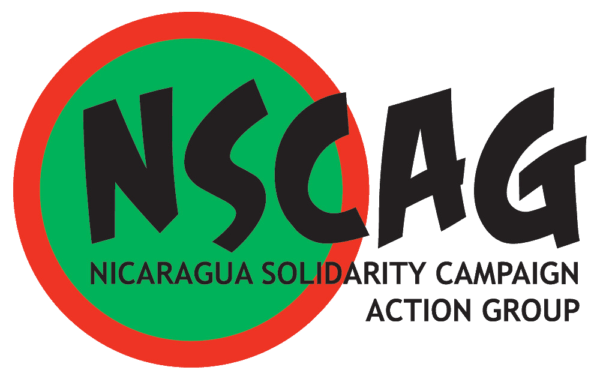Nicaragua Solidarity Campaign Action Group
28 September 2021
Agroecology, school gardens, and healthy school meals
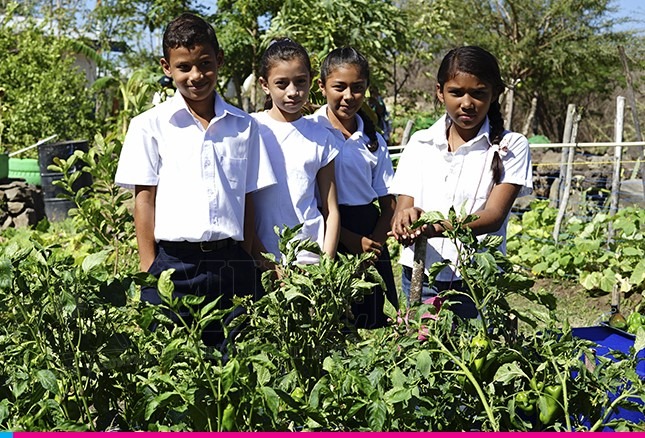
Indiana Montoya and Yorlis Luna describe how children, teachers, university students and parents in the rural schools in Los Copeles and San Miguelito have worked together on school gardens that provide healthy ingredients for school meals and bring communities together.
“I thought agroecology was only organic farming … but now I understand that agroecology is not only a technique, but a philosophy and a way of life.” Luisa Castro, student
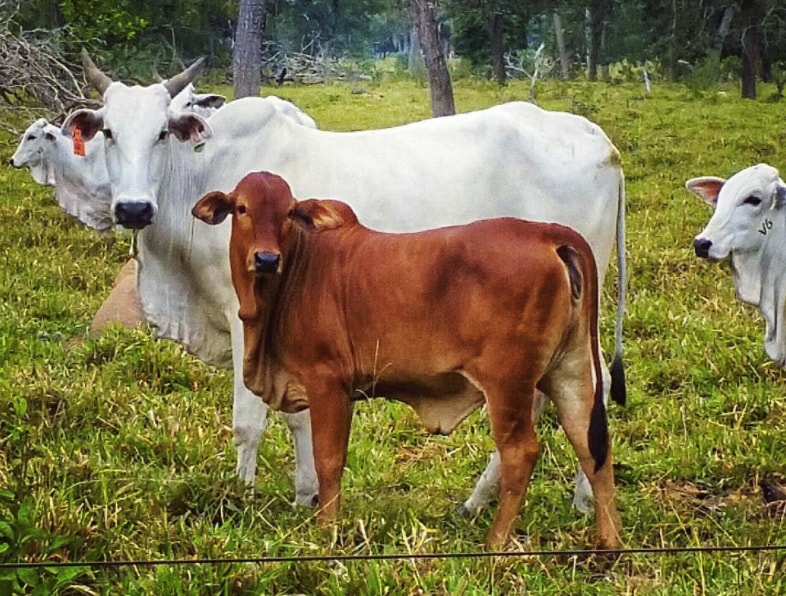
The two communities are in the department of Chontales in the dry zone of Nicaragua where agriculture has traditionally been based on the extensive grazing associated small and medium scale cattle ranching and the cultivation of basic grains such as red beans and maize.
Many peasant families have owned their land since the agrarian reform programme of the Sandinista government in the 1980s; however, they still live in poverty caused by multiple factors, including the strong focus on the monoculture of cattle ranching.
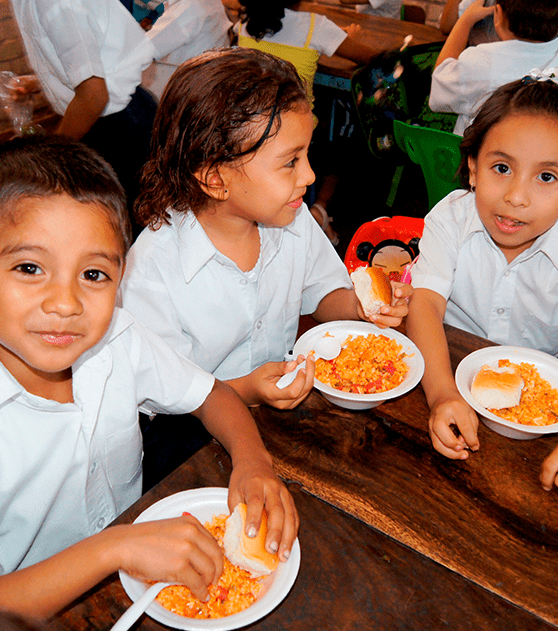
As part of a well-integrated poverty reduction programme the Ministry of Education (MINED) has a school meals programme for 1.2 million children. The purpose of this programme is to ensure all children receive at least one nutritious meal per day, to contribute to ending hunger, and to improve school retention.
To complement this programme MINED also promotes the setting up of gardens in both primary and secondary schools throughout the country. The purpose of the gardens is to strengthen the culture of Nicaragua as a largely rural country, to recognise the role of the peasantry, and to motivate children and young people in agricultural production and innovations to maximise the use of land.
These school gardens are the result of the work of MINED in collaboration with other state institutions and the communities themselves.
The meals consist of rice, beans, and maize: the parents of children and young people are responsible for preparing the food [provided by MINED] complementing it with whatever is available in the community including the produce from the gardens.
The example of the school gardens in Los Copeles and San Miguelito
Examples of these gardens are two that have been established in rural schools in Los Copeles and San Miguelito in the department of Chontales that involved the children themselves working together with university students and teachers, and children’s parents.
The time when MINED’s programme was established coincided with issues that the teachers were concerned about: how to improve school meals, the amount of unused land in the area, and the fact the children were disconnected from the countryside.
Teachers and students from the National Autonomous University of Nicaragua – Multidisciplinary Regional Faculty FAREM – Chontales got involved as part of their agronomy studies in 2020.
The San Miguelito community school operates from Monday to Friday offering preschool and multigrade primary school from 1st to 6th grade. At the weekend multi grade and high school classes are offered to 69 students from 14 to 20 years olds from campesino/a families. The Los Copeles community school is only for the youngest children.
As part of the programme the children themselves, together with teachers, parents and university students, repaired the school’s perimeter fence, planting elequeme, black wood and jocote seedlings, fenced off an area to protect it from chickens and animals, cleared and prepared the land, found seeds of all kinds to plant – plantain, yucca, malanga, sweet potato, beans, vegetables, medicinal plants and fruit trees – …and organised irrigation and looked after the crops.
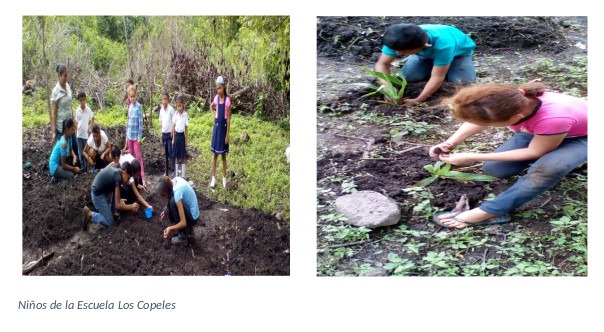
Sharing knowledge, sharing skills, building communities based on solidarity
There is a popular saying that goes “seeing is believing”. This is what this experience has been like: concerns, sadness, uncertainties, but also encouragement, dreams and willpower. Only the combination of these disparate energies has made the creation of the two community gardens possible.
The gardens have been a true sharing of knowledge between young people from the countryside and the town, a significant learning experience for all: a classroom and a living laboratory for both students and teachers of the agroecology class.
The setting up and development of the gardens has been led mainly by women and young people. Through their strength and mutual support both men and women have been able to progress.
Young farmer, agronomy student and community leader Henry Rosales Matus describes what setting up the gardens has meant: “this process lifted my spirits in the midst of so many difficulties. Initially we didn’t know what to do. [However] after this activity I feel very motivated to continue supporting my community and committed to the garden at the small school in Los Copeles, to ensure it continues to function well and efficiently…through this process I gained a lot of experience, it was beautiful.
It is so necessary to bring together efforts to minimise migration from the countryside, and [reduce] poverty through training children and young people who are the ones who will produce food in the future …”
Student Judith Gonzalez describes what it meant to her: “At the beginning it was hard for me to talk to the young people in the community, I felt very anxious and afraid, but then the experience became more rewarding. I am starting to make changes at home, reusing [things] and growing aromatic herbs, vegetables and fruits, I hope to be able to help my neighbourhood and family through this garden.”
Danieska Morales Suárez commented: “…we all worked together, with joy and hope. At the beginning I was sure that I would not participate because of some family problems related to the pandemic, however, I ignored negative comments. On the first day we didn’t manage to talk to the young people in the community, but then we managed to organise ourselves and socialise, it was fun…! The other days were fantastic, because we were all more confident and we were able to move forward. …we made some mistakes, for example the seedbed was left unprotected, and we had to set it up again. For me the realisation of this garden has been very important … in this beautiful productive experience we were able to learn and teach as well as identify the benefits offered by the school garden to the student community based on agroecological principles.”
One of the parents commented: “it is beautiful everything that is being done, the good thing is to plant what is available, it is going very well, the children and young people have everything great, they have planted onions, beans and their own little things. “
Indiana Montoya was one of the teachers: “For university teachers it has been an enriching process because we threw ourselves into the unknown regardless of criticism and fear of failure… rather we saw it as a challenge in which knowledge, friendship and relationships with students of all years primary, secondary, university have been strengthened.”
This experience demonstrates that school gardens producing a diversity of crops, designed from the pedagogy of love among people, at all levels, at all ages, with people from both the countryside and towns, are a pedagogical tool that with collective action generate small and big changes, so necessary in the world in which we live.
The experiences in the school gardens in this area of Nicaragua have taught us that the solutions to poverty go through multiple processes. Agrarian reform is fundamental but not enough: real investment in the countryside is needed, but [this must happen] hand in hand with collective learning processes that help historically excluded and marginalised families to gain confidence, to overcome internalised fears, to forge fairer and more loving family relationships and to believe in themselves.
These processes are not easy, they need patience, trust and time. But, above all, processes from within the community and on a personal level, focused on the use of local resources and supported by the involvement of multiple actors. Processes that help change people to change realities with their mind and heart.
This is how Nicaragua is, small but enormous, continuing to move with concrete actions towards diversification of crops and the involvement of young people.
School gardens grow, flourish and inspire, motivate, excite and engage.
—————————————————————————————–
Further information in Spanish about the Ministry of Education’s school gardens programme https://www.mined.gob.ni/programa-integral-de-nutricion-escolar/
This is an edited version of an article that first appeared on the website Tortilla con sal http://www.tortillaconsal.com/tortilla/node/12949
